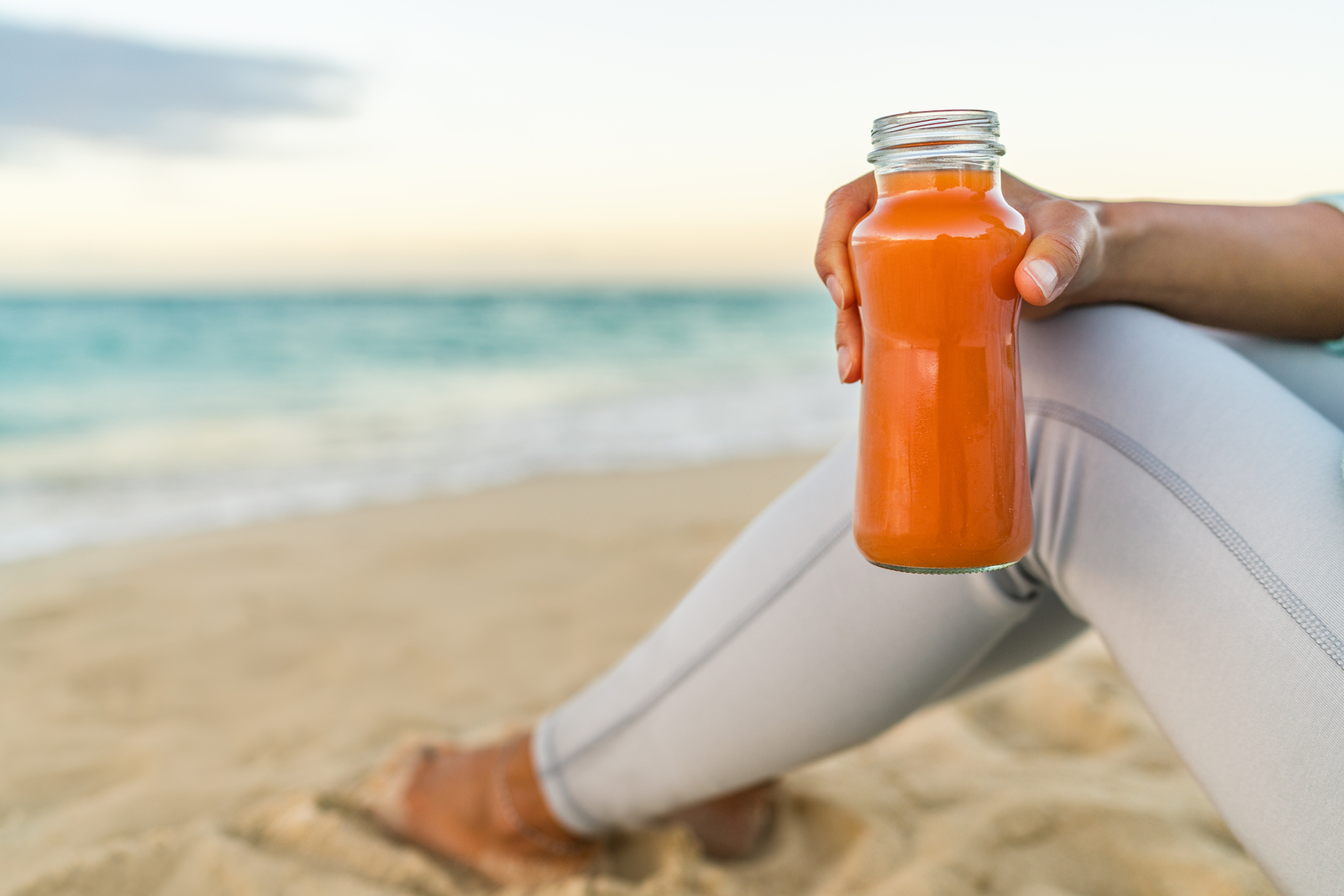By Frank Lipman, MD
A note from Marcelle: There’s a lot of buzz about detox right now, and we’re glad of it. Detox should be part of every woman’s effort to take control of her health. To help you learn how, we’ve asked Dr. Frank Lipman to share his perspective. Frank specializes in detoxification; he’s the author of a wonderful book on detox, Total Renewal, and his approach is identical to our practice here at Women to Women.
Here are the sections you’ll find in this article:
- Why effective detox is a necessity
- Environmental toxins
- What is detoxification?
- Assessing the burden on your detox system
- Symptoms of toxicity
- How to detox your body naturally
In more than 25 years of clinical experience, I’ve had the great pleasure of working with thousands of patients from all walks of life. Over time, I’ve seen how few of us are able to stay healthy and feel really well as we get older. Many of us have come to accept developing a degenerative disease or simply feeling incrementally worse each year as part of the aging process.
It’s not. There is so much we can do to take control of our health and support our bodies happily and healthily our entire lives. And it begins with understanding what kind of “burden” your body is under right now, today, both physical and emotional, and lessening it.
Think of yourself as a ship floating in water. You will ride high or sink low depending on the burden you carry. The more burdens you unload, the better you will feel. I strongly believe that detoxification is an effective way to unload these burdens and is an essential — and often overlooked — aspect of total healthcare.
In my book, Total Renewal, I go into detail about the seven steps I recommend to detoxify your body, rebalance your biochemistry, and build resiliency for a new lease on your health. I’d like to take this time to introduce the basic ideas behind this concept and the importance of detoxification. These steps reflect the same ideals and integrative approach I share with the practitioners at Women to Women, and I welcome the opportunity to bring them to you. So let’s begin.
Effective Detoxification is a Necessity
I came to realize the importance of detoxification after studying Chinese medicine and being in practice for a number of years. I learned from Chinese medicine that we (humans) are all microcosms of the macrocosm (the universe), that we are part of it and intricately connected to it. Therefore what is happening to the environment will and does affect all the species in it, including man.
Environmental pollution is not only changing the ozone layer, plant species and animals, but humans as well. But only after seeing more and more young women with breast cancer and infertility problems; patients with chronic fatigue and chemical sensitivities; and more and more patients complaining of aches and pains and degenerative problems, did I suspect something was not right.
It was at that time — about 15 years ago — that I realized that most of these problems were not “normal” aging problems, but rather malfunctioning detoxification systems. I was shocked to discover vast amounts of literature on where these toxins are coming from and what they are doing not only to the environment, but to our health and especially our children’s health.
I began to identify one common link to many of the health concerns I witnessed in my patients: an inability to cope with their toxicity load. It was then that I realized that detoxification is an absolute necessity.
Environmental Toxins
Although technology and industry have helped us to live more comfortably and have generally enhanced our way of life, we are paying a heavy price. The air we breathe, water we drink, and food we eat are no longer clean. Our environment is contaminated and polluted. Since the 1940’s there has been an explosion of synthetic products. We are the first generation of humans to be exposed to so many synthetic chemicals.
In the past 60 years, these processes have been significantly altered:
- How food is grown and packaged
- How homes are built, furnished, and cleaned
- How lawns and gardens are maintained
- What cosmetic products we use
For instance, there are approximately 75,000 chemicals now in common use. Of these, fewer than 3% have been tested for carcinogenicity, and no safety studies have been done on more than half of them. In our daily life, we now use more than 50,000 chemicals, more than 3000 chemicals are deliberately added to our food, and the average home contains more than 1000 chemicals. The EPA has reported nearly 30 cancer-causing chemicals in the fatty tissue (where toxins are usually stored) in most Americans today. All these toxins put a heavy load on your system, causing you to feel like you are “sinking,” and increasing the need for detoxification.
A recent report by the Organic Consumers Association shows that our children are exposed to harmful pesticides, such as melathion and chlorpyrifos, mainly through our food supply (not by spraying) and that an organic diet will provide “dramatic and immediate” protection.
What is Detoxification?
Unfortunately most people think of detox as withdrawal from drugs like alcohol and cocaine, but actually it is much more. Detoxification is a primary function of the body — and the body’s most energy-consuming metabolic process.
Your body is detoxifying all the time; it has its own body-cleansing system consisting of enzymes, hormones and lymphatic fluids that rid the body of unwanted materials or chemicals.
Although it may sound like a strange concept and Western medicine doesn’t pay much attention to it, there is a lot of research documenting the role of detox in health and disease. When I reviewed this literature, I discovered that in the last 20 years, scientific discoveries have given us great insight into our biochemistry and the intricacies of our bodies’ detoxification systems.
We now know that nutrition and lifestyle are critical in supporting our natural ability to detox. We know what nutrients are needed, as well as what chemicals inhibit and which ones stimulate the enzymes essential to detoxification. We also have a more sophisticated understanding of how chemicals from the environment — including medical drugs — are broken down and eliminated, what may prevent this, and what may help this process.
Toxins (which I define as anything that your body interprets as harmful or stressful) enter your system in many ways, not just through your mouth. Everything we breathe or absorb through our skin, eyes, and ears can be a boon or a deficit to our system, not least of all emotional stress.
To filter this constant stream of potential toxins, we need hundreds of enzymes, vitamins and other molecules. Our bodies must get the raw materials necessary to synthesize these molecules to help take the good from what we ingest and get rid of the rest.
Detoxification as a Physical Process
Your liver and gastrointestinal (GI) tract are the major organs responsible for detox. Think of them as your body’s sanitation department. Chemical conversions occur in these organs that fundamentally alter the molecular structures of substances so they become useful or not.
It is important to remember that the GI tract, or gut, is the largest organ in your body. It’s responsible for your digestion, absorption, elimination, and immunity. It’s also a sensory organ, connected to your brain through neurotransmitters and receptors. This means it is directly linked to your mood and perception of well-being.
Your detoxification system gets overwhelmed when the rate of exposure is greater than what your body can handle, the liver and/or intestines are not functioning optimally, or specific nutrients required for detoxification are lacking. So balancing your gut and supporting your liver nutritionally are essential.
A breakdown in your detox system results in a range of symptoms. Some are subtle, leading you to repetitive trips to the doctor. Eventually this breakdown may manifest as disease. Either way, the most effective approach requires a commitment to identifying and removing unnecessary burdens and providing needed support — not covering up symptoms with long-term medication.
Assessing the Burden on Your Detox System
Once toxins enter our bodies, everyone responds differently. This individual response depends on genetically-determined available enzymes, nutritional status, how many toxins you have been exposed to over the years and the state of your detox system. That’s why, ideally, it is best to work with a practitioner knowledgeable in the subject to determine your unique needs.
Please click here to examine a list of potential toxic burdens (there may be others, depending on the individual). Everyone has a different level of resilience to particular stresses, but no one is immune to the effects of a toxic overload. We just range in degree.
Symptoms of Toxicity
These can be as varied as the individual, but generally speaking they manifest as:
- Headaches, fatigue, weakness, muscle and/or joint aches and pains
- Brain fog, poor concentration, irritability, depression, mood swings
- Allergies, stuffy nose, coughing
- Rashes, itching, hives
- Digestive symptoms/IBS/GI upset
- Sensitivities to chemicals, foods, drugs
Toxicity may also play a role in the following diseases and conditions:
- Cancers, Parkinson’s, Alzheimer’s, autoimmune diseases
- PMS, infertility
- Irritable bowel syndrome, chronic fatigue syndrome, fibromyalgia
- Psoriasis, eczema, acne
Often, symptoms of toxicity first arise as digestive disturbances (bloating and gas after eating, foul-smelling stools, diarrhea and/or constipation), bad taste in mouth, acid reflux and heartburn. This usually indicates a growing food sensitivity or allergy that may be the first indication of a breakdown in your detoxification system. We become so used to feeling slightly ill after we eat (or all day long) that we mentally override our early warning systems.
How to Detox Your Body Naturally
Most detox programs treat the gut and the liver first, moving into detoxification of the blood and kidneys only after the GI tract and liver are functioning properly. I personally don’t recommend extreme fasts or harsh colon cleansers as they tend to shock your other systems by releasing too many toxins too quickly. This can leave you incapacitated and discouraged.
Instead, I encourage you to look at detoxification as a paradigm shift — one in which you slowly and consistently work with your body to make different choices on what to remove and what to add to your total health picture. This is the only way to make permanent, fundamental improvements to your health and sense of well-being. It’s not the quick fix, but it works and it is never too late to start.
In my book, Total Renewal, I explain the seven steps I think are necessary for supporting your detoxification system and enhancing your health. They are, briefly:
Take responsibility for your health. This means paying attention to your intuition (and perhaps challenging conventional treatment) when you think something is not right. It means working to find a holistic practitioner you can trust to monitor your detox program.
Remove toxins and decrease your toxicity load. This usually begins where most toxins enter our system, in the gut and liver, but importantly includes decreasing exposure to environmental and emotional toxins. Studies have shown that most people are likely to have the greatest contact with toxic pollutants inside their homes and offices. So creating a healthy home is essential, in addition to drinking filtered water, washing all your produce, and eating organic food. For more specific suggestions, log on to my website.
One hidden source of toxins is cosmetics, lotions, and other body-care products. Click here for a list of unhealthy ingredients to avoid when shopping for these items.
Recognize your unique diet. Follow a detox diet that substitutes lean, organic meats, whole grains, and fresh vegetables and fruit for foods high in chemicals, artificial additives, transfats and sugar. For more specifics on my Restorative Diet, click here.
If your symptoms are extreme, you may need to follow a strict elimination diet that removes the most common allergens from your diet (dairy, wheat, eggs, peanuts, yeast, shellfish, beef, pork, veal, soy products, citrus, strawberries, nightshades, corn and chocolate) for a certain period of time and then reintroduce them.
Treating GI conditions such as parasites, yeast overgrowth, or unhealthy bacteria through nutrients and diet is also part of recognizing what your individual digestive requirements are.
Replenish nutrients and balance hormones. I strongly encourage you to work on this step with a professional healthcare practitioner who can determine what your individual needs are. Generally, this may include optimizing liver function, replacing stomach acids and digestive enzymes through supplements and reinoculating the GI tract with beneficial bacteria and microflora. Additionally, I treat any nutritional deficiencies with a good multivitamin that includes B vitamins. I usually add essential fatty acids and other nutrients that may be necessary.
Release tension and relieve stress. Mindful exercise like yoga and t’ai chi, combined with meditation, is just as important to your detox program as your diet. Moving your body is the only way to release physical tension. It is best to try some combination of aerobic and strength exercise with stretching.
Acupuncture, massage and other kinds of bodywork, particularly restorative energy work, are practices that have been proven successful at redirecting blocked energy and relieving chronic pain and stiffness. Lymphatic massage helps drain toxins from your glands — plus it feels good!
Revitalize with a strict liver detox. You can’t be truly healthy if your liver isn’t functioning properly. Your gut is connected to your liver through the portal blood system. If your GI tract is dysfunctional, more toxins pour directly into your liver. The first five steps should help you rebalance your GI tract and your metabolism. This step is meant to fortify your liver.
Liver overload occurs when the liver is exposed to more toxins than it can handle, you’re lacking or inhibiting critical nutrients and enzymes necessary for liver function, or you have a genetic predisposition. Once you have incorporated the first five steps of renewal into your life, you may be ready to go further with a one to three week liver detox plan. This entails:
- Following a liver cleansing detox diet/doubling your intake of filtered water
- Supporting your liver nutritionally
- Neutralizing free radicals
- Pursuing other detox measures (like lymphatic massage, sauna use, etc.)
- Getting lots of sleep and relaxation
If you have followed all of these steps and still feel terrible, you may be experiencing heavy metal toxicity. This is best treated through a responsible healthcare practitioner with knowledge of biodentistry, chelation therapy, and specific detox procedures.
Reconnect to yourself, others, and nature. Understanding our place in the Universe, where we belong, who we are, and what we are responsible for are some of life’s greatest challenges. But you can begin to find some answers by using the same approach we’re discussing. No one can be expected to figure it all out right away, but little steps can lead to huge strides over time — and a significant improvement in your energy and health.
“Talk therapy” can be very useful at freeing our minds of mental burdens. Most of us carry some emotional baggage around. What we don’t often know is that there are lots of ways to either lighten or relinquish the load — but it’s hard to go it alone. Talk to your healthcare practitioner, trusted friend, or family member for referrals and don’t be afraid to try a few people to find one you like.
Building community is the next ripple that extends past the drop of your personal detox pebble. Connecting with others in a positive way works both ways: it makes you feel better and makes others around you healthier too.
Recognizing our deeper connection to a greater power, either through nature or religion, helps us to understand that each and every one of us are part of something larger than just ourselves. We are all powerful agents of change. It is my sincere hope that you will embrace your power and put it to good use, for your own health, that of your loved ones, and the world.







